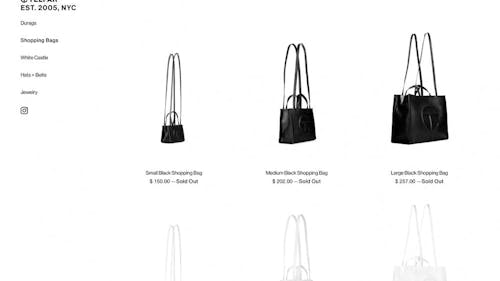Everything we love about Telfar

Brooklyn-based Liberian-American fashion designer Telfar Clemens has made his brand Telfar’s shopping bag a staple accessory in today’s world of fashion. This vegan leather bag, monikered the Bushwick Birkin, circumvents the existing ideal of the designer bag with its accessible, affordable and wearable qualities.
The shopping bag is modeled on the dimensions of the luxury department store Bloomingdale’s brown paper bag and was first launched in 2014. Coming in three sizes and a variety of wearable and eye-catching colors, the undeniably infectious bag appeals to a new generation of people who value both fashion and function equally.
Apart from its signature bags, Telfar also sells monogrammed CT hats, belts, jewelry and recently launched a line of durags. In 2017, Telfar also designed the unisex uniforms for fast-food chain White Castle, a brand that Clemens has fond memories of from his youth.
Established in 2004 as a fashion project, Telfar doesn’t just speak to its customers, it roars. Its identity is cemented in the motto “NOT FOR YOU — FOR EVERYONE.” The brand’s artistic director, Babak Radboy, described the dedicated Telfar customer as a “Black-adjacent, queer-adjacent” person whose absence was notable in the world of fashion advertising until recently, according to The New Yorker.
“Unisex since day one, it’s favored by a sociopolitically progressive, sexually and racially diverse set — one historically ignored by the industry,” according to a recent Financial Times article.
Clemens has no intention of being a part of the often monotoned fashion and art worlds’ platitudes of “diversity” and “inclusivity,” according to The New Yorker. As a brand closely informed by its designer’s identity, Telfar drives its own narratives with honesty and represents its people in bold yet earnest ways. It goes beyond the performative optics and cultural tokenism that regularly occurs in fashion marketing, especially when it comes to any kind of representational reckoning.
Clemens discussed the struggles of creating fashionable goods at an affordable price point and his bags’ journey in becoming the internet sensation it is today, according to Paper Magazine. When asked about the appeal of his brand and the bags’ prices, which ranges from $150 to $257, to his customer, Clemens said, “Most cool people aren't rich. We wouldn't be interested in making clothes our friends couldn't get.”
Telfar recently made its way back into the news this summer due to a tweet from an account associated with an online reseller, Hypernova Group, which was buying up stocks of coveted shopping bags and arbitrarily hiking up their price in the market.
While reselling culture has been around digitally in the contemporary world of fashion for quite some time, many fans of Telfar, in particular, took to Twitter to express their frustration with reselling culture and bots, and the blatant disregard for the brand’s motto and mission.
To combat the issues arising from reselling in July, Telfar swiftly responded with a unique business model of its Bag Security program in August. The program allowed people to pre-order bags within a 24-hour period and guaranteed delivery before Jan. 15, 2021, so that the brand could meet demand while continuing to stay 100 percent self-financed, according to a post on Instagram encouraging customers to “secure the bag.”
As a proud Black-owned business, Telfar has made its way into the stylistic imagination of mainstream fashion thanks to the fervent support of the Black and queer communities that the brand resonates with.
New York-based fashion consultant Antoine Gregory best described the hype surrounding Telfar when interviewing with Essence this month: “Black business does not mean small business. Black business doesn’t mean charitable. It (the shopping bag) quickly became a status symbol — a symbol of community.”
With its loyal community of customers and celebrity endorsements from the likes of Solange Knowles and Congresswoman Alexandria Ocasio-Cortez, Clemens continues to be a trailblazer in the fashion industry and shows no signs of stopping at imbuing luxury fashion with new, more visionary sensibilities.



